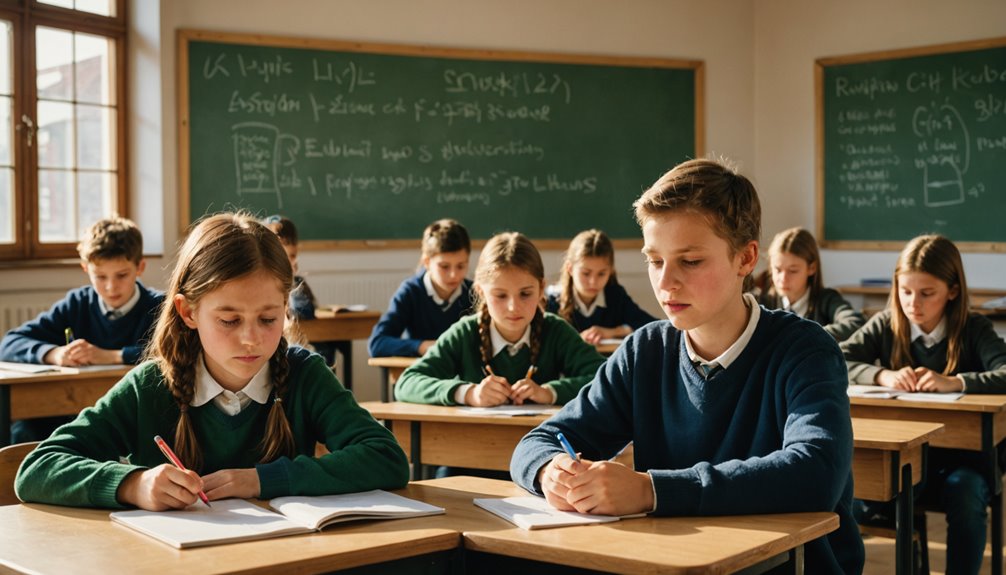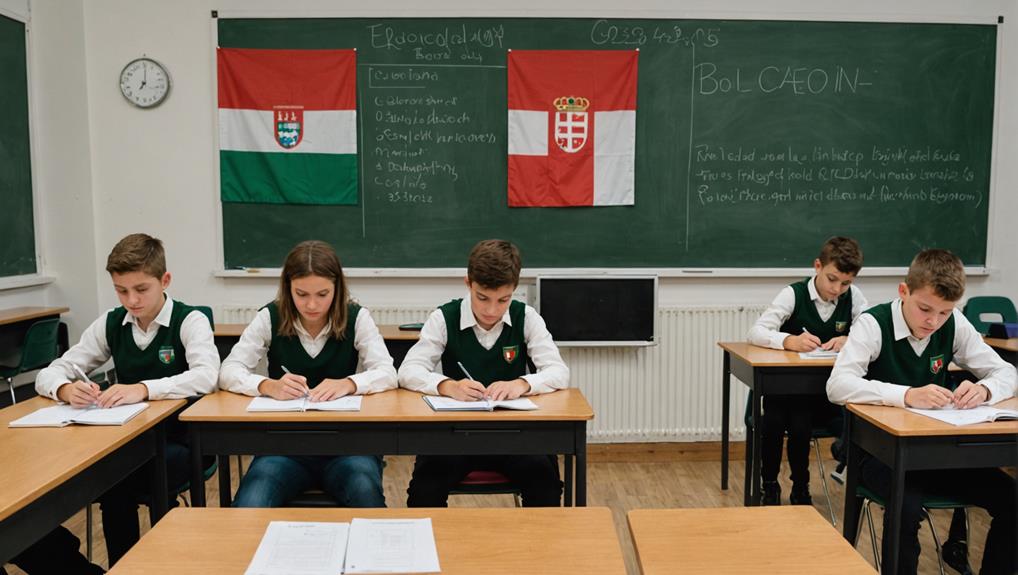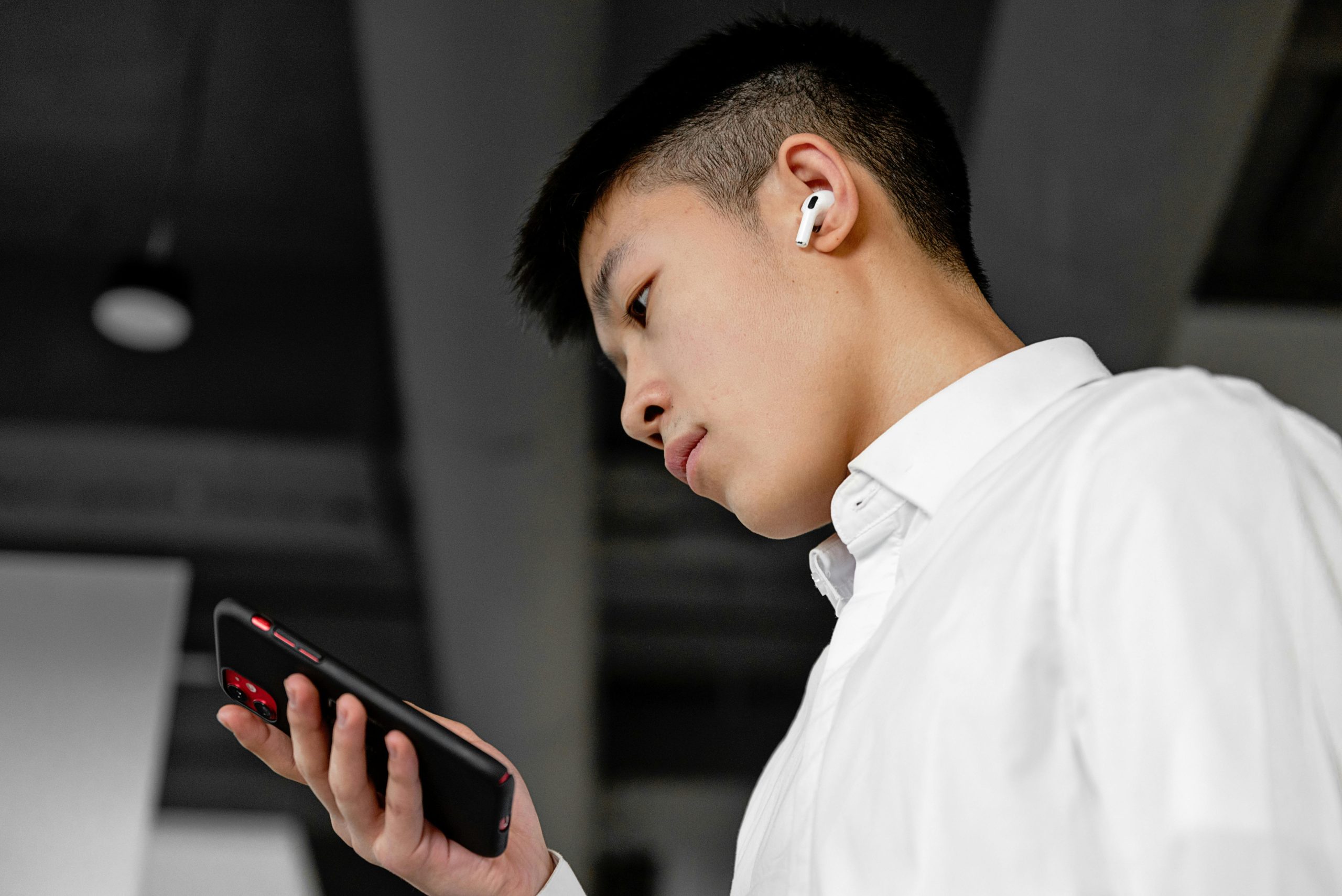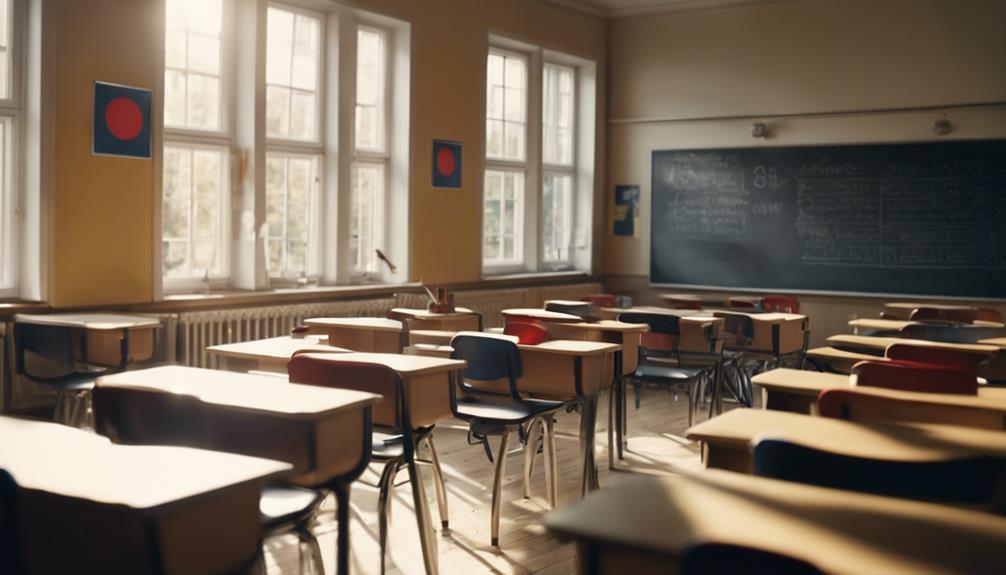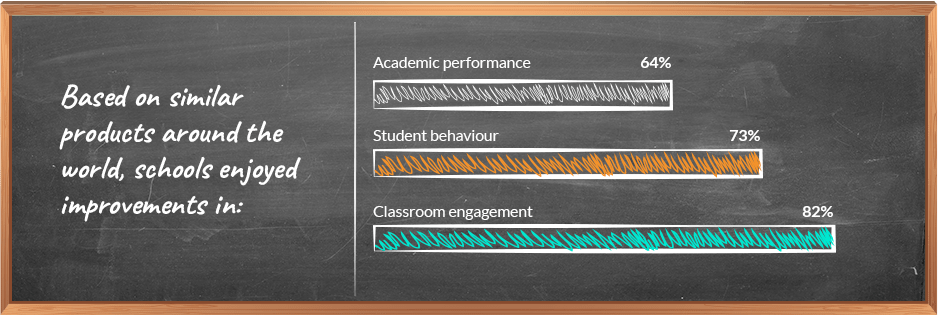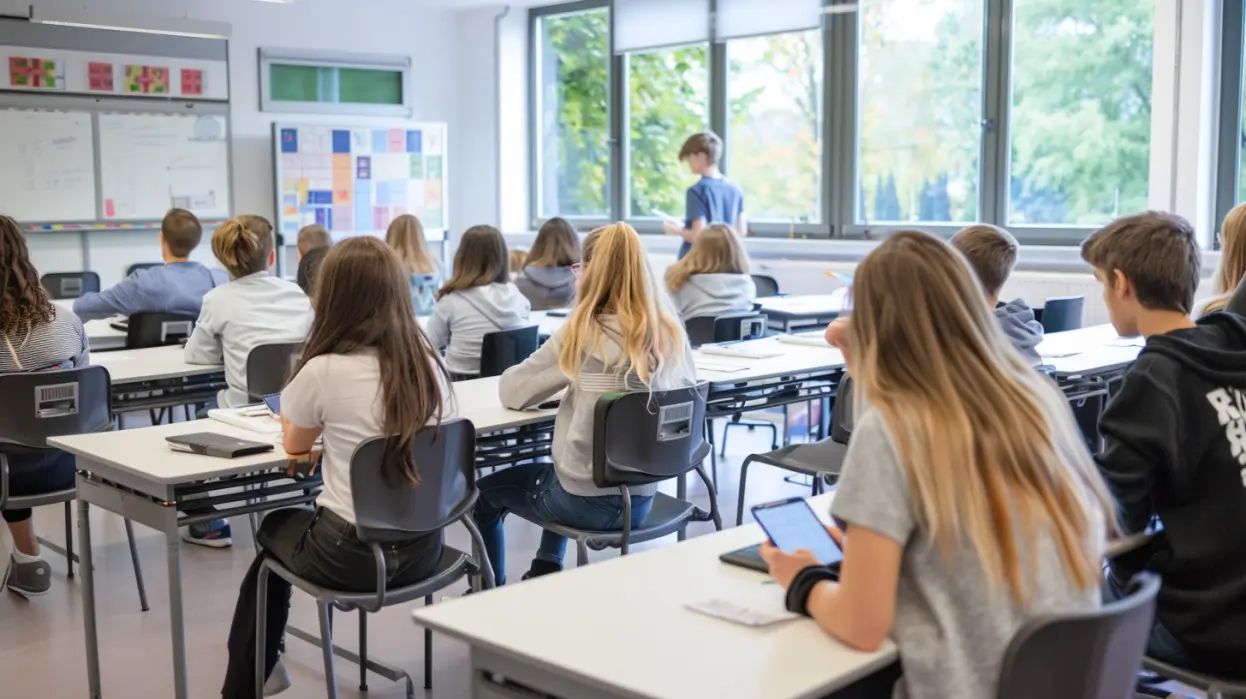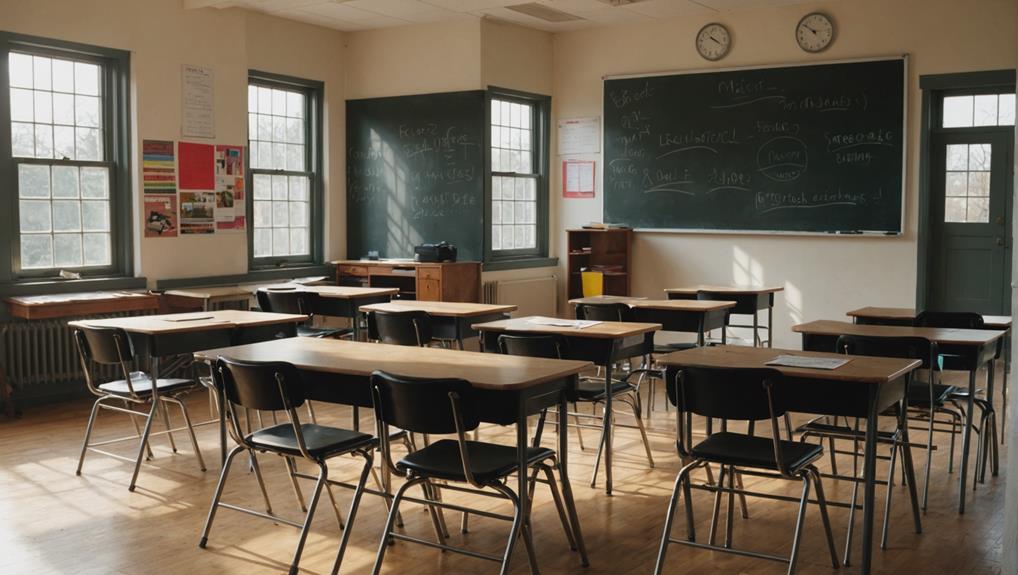Uso del telefono nelle scuole ceche: divieto o blocco?
Le scuole ceche hanno la autonomia per stabilire le proprie politiche sull'uso del telefono cellulare, il che porta a una notevole variabilità. Alcune scuole, come quelle di Vsetín, hanno implementato divieti telefonici per migliorare l'attenzione accademica e l'indirizzo dipendenza dalla tecnologia, riflettendo una tendenza globale nella politica educativa. Tuttavia, questi divieti affrontano sfide tra cui resistenza degli studenti e preoccupazioni dei genitori sulla comunicazione e sui diritti personali. L'efficacia di tali politiche è spesso compromessa da un'applicazione incoerente e da difficoltà logistiche. Mentre le scuole ceche bilanciano alfabetizzazione digitale riducendo al minimo le distrazioni, la comprensione di queste dinamiche rivela le complessità insite nell'istituzione di policy efficaci per l'uso del telefono.
Punti chiave
- Nella Repubblica Ceca le scuole hanno la possibilità di stabilire autonomamente le proprie politiche sull'uso dei telefoni cellulari, che vanno dal divieto assoluto all'uso illimitato.
- Il divieto di usare il telefono in alcune scuole ceche mira a migliorare l'attenzione accademica e a frenare la dipendenza dalla tecnologia tra gli studenti.
- Il coinvolgimento e il sostegno dei genitori sono essenziali per l'attuazione efficace delle politiche sull'uso del telefono nelle scuole ceche.
- Le difficoltà nell'applicazione del divieto di utilizzo del telefono includono la resistenza degli studenti, l'incoerenza degli insegnanti e problemi logistici.
- Le politiche vengono adattate in base al feedback e sottolineano l'importanza dell'uso responsabile della tecnologia e dell'educazione alla sicurezza online.
Le scuole ceche stabiliscono le proprie regole per i telefoni cellulari
Nella Repubblica Ceca, il autonomia concessa alle scuole la legge nazionale consente loro di stabilire le proprie politiche di utilizzo del telefono cellulare, con conseguente panorama diversificato di normativeQuesta flessibilità porta a una mancanza di coerenza politica, con alcune scuole che adottano divieti completi e altri che implementano restrizioni parziali o consentendo uso illimitatoTale variabilità riflette spesso i diversi livelli di coinvolgimento dei genitori, poiché le scuole negoziano con i genitori che potrebbero avere opinioni contrastanti sull'uso degli smartphone.
L'impatto educativo dei telefoni cellulari è un fattore cruciale in queste discussioni. La ricerca indica che l'uso senza restrizioni può portare a significative distrazioni negli studenti, ostacolando il rendimento scolastico. Di conseguenza, alcune scuole scelgono di implementare misure più severe per mitigare queste distrazioni, promuovendo un ambiente di apprendimento più mirato.
Tuttavia, ciò solleva interrogativi sul raggiungimento di un equilibrio tecnologico, poiché le scuole devono trovare il modo di integrare strumenti tecnologici utili senza compromettere gli obiettivi educativi.
L'approccio ceco evidenzia la sfida di allineare politiche diverse con obiettivi educativi sovraordinati. Mentre l'autonomia consente soluzioni su misura, può anche portare a risultati non uniformi. Esplorare un più approccio standardizzato potrebbe aiutare ad armonizzare i vantaggi della tecnologia con la necessità di mantenere un quadro educativo efficace.
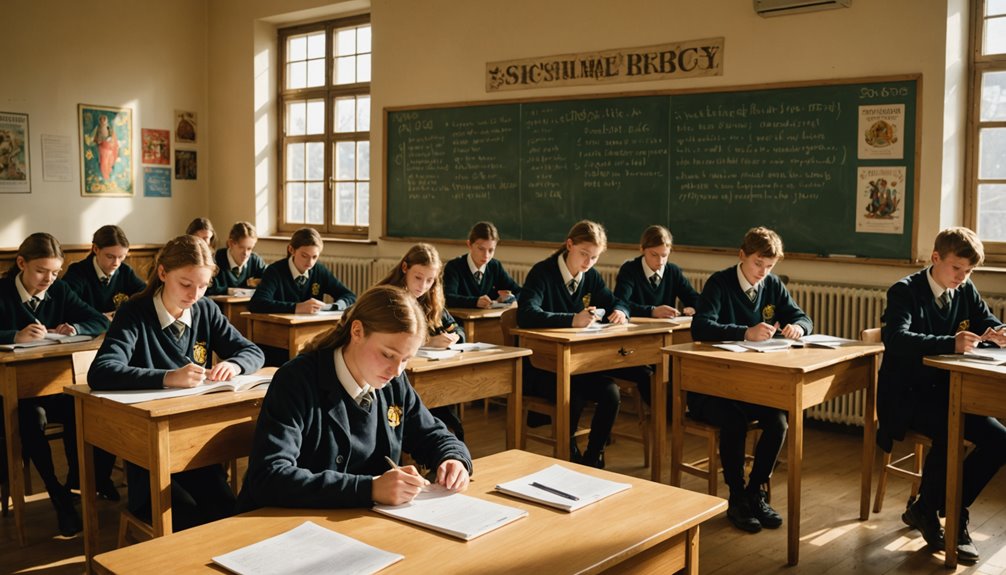
Vsetín attua il divieto telefonico nelle scuole
In Settembre 2024, la città di Vsetín nella Repubblica Ceca Regione di Zlín è diventato il primo comune del paese ad applicare una divieto assoluto di utilizzo dei cellulari nelle sue scuole primarie. Questa politica rivoluzionaria si applica a cinque scuole elementari gestite dal consiglio comunale. In base alle nuove regole, gli studenti devono consegnare i loro telefoni agli insegnanti all'inizio della giornatae i dispositivi sono conservati in modo sicuro in armadietti con serratura, restituito solo al termine della giornata scolastica.
Per garantire un'applicazione coerente, il consiglio ha investito in scatole di stoccaggio sicure per tutte le classi. La non conformità è trattata come una violazione delle regole scolastiche, con conseguenze che vanno dagli avvertimenti ai rimproveri formali da parte dei presidi. L'iniziativa mira a:
- Eliminare le distrazioni durante le lezioni.
- Incoraggiare le interazioni interpersonali durante le pause.
- Ridurre i rischi del cyberbullismo.
Mentre molti educatori e genitori sostengono il divieto, citando il suo potenziale per migliorare l'attenzione accademica e ridurre dipendenza digitale, altri l'hanno criticata. Alcuni considerano la politica eccessivamente autoritaria, che ricorda le restrizioni dell'era socialista del passato, e sostengono che viola diritti dei bambiniNonostante queste critiche, La politica di Vsetín ha acceso il dibattito nazionale e potrebbe servire da modello per altre città ceche che stanno prendendo in considerazione misure simili.
Motivi del divieto
La decisione di Vsetín di imporre il divieto di usare i telefoni a scuola è radicata in una moltitudine di considerazioni educative e di sviluppo. La motivazione principale è incentrata sul impatto sull'apprendimento, poiché la ricerca evidenzia costantemente come i telefoni cellulari distraggano gli studenti e diminuiscano la concentrazione, compromettendo così l'insegnamento efficace. Questa decisione è in linea con un più ampio riconoscimento globale che ridurre il tempo trascorso davanti allo schermo può migliorare coinvolgimento degli studenti e contribuire positivamente a rendimento scolastico.
Diversi fattori chiave sottolineano la necessità di questo divieto:
- Disgregazione accademica: I telefoni cellulari sono una distrazione significativa, riducendo l'attenzione degli studenti attenzione e coinvolgimento nelle lezioni. Le notifiche e le interruzioni dei social media ostacolano la concentrazione mentre il divieto di usare i telefoni crea un ambiente più favorevole all'apprendimento.
- Rischi per la salute mentale: L'uso eccessivo del telefono è collegato a ansia, depressione e scarso sonno tra i bambini. Gli studi rivelano che 40% di studenti cechi del nono anno mostrano segni di depressione da moderata a grave, sottolineando la necessità di affrontare uso eccessivo del digitale nelle scuole.
- Preoccupazioni sullo sviluppo: I telefoni possono fare acrobazie comunicazione verbale, pensiero critico, E interazione socialeL'eccessiva dipendenza dagli schermi riduce la capacità degli studenti di relazionarsi in modo significativo con i coetanei, abilità essenziali per il loro crescita personale e accademica.
- Prevenzione del cyberbullismo: Limitando l'accesso al telefono, le scuole mirano a ridurre il cyberbullismo durante l'orario scolastico, favorendo un più sicuro e più solidale ambiente per gli studenti.
Mentre alcuni genitori sono preoccupati per la severità del divieto, molti sostengono il suo potenziale di riduzione dipendenza digitale e promuovere abitudini più saneQuesta politica rappresenta un passo avanti verso l'equilibrio del ruolo della tecnologia nell'istruzione, dando priorità benessere degli studenti.
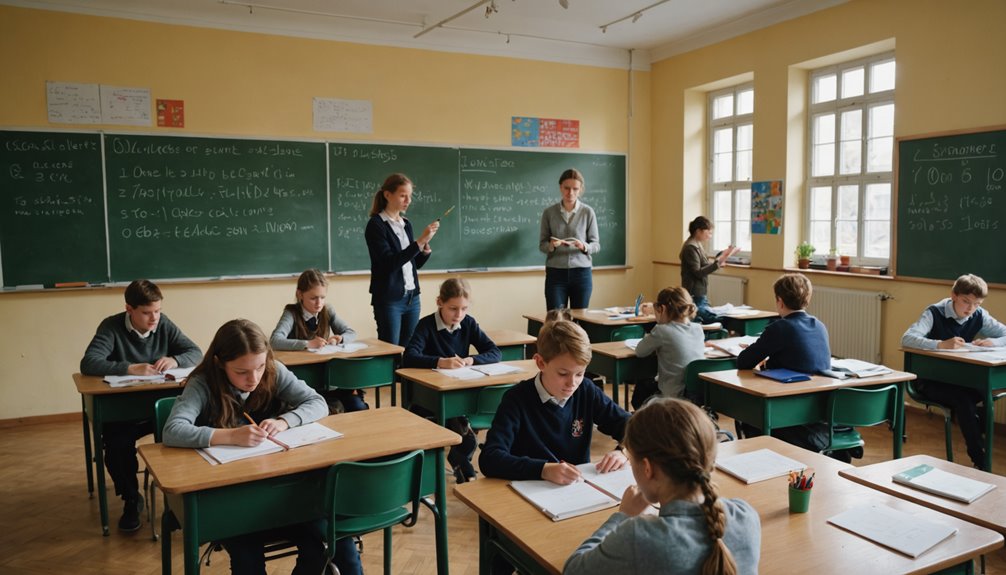
Sfide e critiche all'applicazione dei divieti sui telefoni cellulari
Nonostante i potenziali benefici del divieto di utilizzo dei telefoni cellulari nelle scuole, diversi sfide e critiche sorgono nella loro attuazione. Preoccupazioni dei genitori sono significativi, con alcuni genitori che percepiscono questi divieti come violazioni dei loro diritti e che ricordano le misure autoritarie. Sostengono che tali restrizioni limitano la loro capacità di restare in contatto con i loro figli durante le ore scolastiche.
Inoltre, gli studenti mostrano resistenza, trovando spesso modi creativi per aggirare i divieti, come nascondere i propri dispositivi o usarli in modo discreto, il che compromette l'attenzione e i miglioramenti comportamentali previsti.
Conformità dell'insegnante è un altro ostacolo, poiché non tutti gli educatori applicano i divieti in modo coerente. Garantire la conformità aumenta le responsabilità degli insegnanti e del personale scolastico, che potrebbero già essere oberati dai doveri esistenti. Questa incoerenza può diminuire l'efficacia della politica e creare disparità nella sua applicazione.
Gli oppositori sostengono che i divieti assoluti ignorano il potenziale benefici educativi dei dispositivi mobili, come l'accesso alle risorse di apprendimento e agli strumenti di collaborazione digitale. La sfida sta nel distinguere tra uso produttivo e distraente.
Inoltre, mandati governativi L'imposizione di tali divieti viene accolta con critiche, poiché alcuni li considerano eccessivi e violano le libertà personali e l'autonomia locale.
Logistica di stoccaggio complicano ulteriormente l'applicazione, poiché le scuole devono garantire la sicurezza dei dispositivi confiscati. Gestire la raccolta e l'archiviazione di centinaia di telefoni ogni giorno rappresenta una sfida pratica, che richiede risorse e infrastrutture che potrebbero non essere prontamente disponibili.
Blocco delle custodie per telefono tramite PhoneLocker offre un modo sicuro per conservare i telefoni durante l'orario scolastico, impedendone furti o manomissioni. Ogni dispositivo è inserito in una custodia individuale che solo il personale autorizzato può sbloccare, assicurando che i telefoni siano conservati in modo sicuro e che le distrazioni siano ridotte al minimo. Questo sistema offre inoltre tranquillità sia agli studenti che alle scuole, tenendo sotto controllo i dispositivi durante tutto il giorno.
Approcci globali ai divieti di utilizzo dei telefoni nelle scuole
La questione dell'uso del telefono cellulare nelle scuole è un argomento di crescente preoccupazione in tutta Europa. Diversi paesi hanno implementato diverse politiche in risposta all'impatto negativo del tempo eccessivo trascorso davanti allo schermo sull'apprendimento e il benessere degli studenti.
In Francia, UN divieto nazionale di telefoni cellulari nelle scuole per gli studenti sotto i 15 anni è stato introdotto nel 2018. L'obiettivo era ridurre le distrazioni e incoraggiare le interazioni sociali faccia a faccia. I primi feedback suggeriscono che il divieto ha avuto effetti positivi sulla concentrazione in classe, anche se alcuni sostengono che limita i contatti di emergenza con i genitori.
Germania adotta un approccio più flessibile, con politiche diverse a seconda dello stato. Alcune regioni impongono rigidi divieti di utilizzo del telefono, mentre altre consentono l'uso del telefono per scopi didattici o durante le pause. Questo modello decentralizzato riflette la convinzione del paese nell'autonomia scolastica, ma crea incongruenze tra le regioni.
In Italia, le differenze regionali portano anche a politiche diverse sull'uso del telefono nelle scuole. Mentre alcune aree hanno imposto divieti assoluti, altre consentono l'uso del telefono in orari specifici. Questa incoerenza ha scatenato il dibattito sulla necessità di una politica nazionale più unitaria.
Finalmente, Finlandia E Danimarca hanno incorporato l'uso responsabile della tecnologia nei loro quadri educativi, promuovendo l'alfabetizzazione digitale insieme alle materie tradizionali. Questi paesi bilanciano l'integrazione della tecnologia con l'obiettivo di promuovere sane abitudini telefoniche.
Questi esempi europei riflettono una gamma di strategie, dai divieti totali all'uso regolamentato, mostrando la sfida di trovare il giusto equilibrio. L'approccio decentralizzato della Repubblica Ceca rispecchia questa diversità, come si vede nella recente mossa di Vsetín di imporre un divieto di telefonia nelle sue scuole.
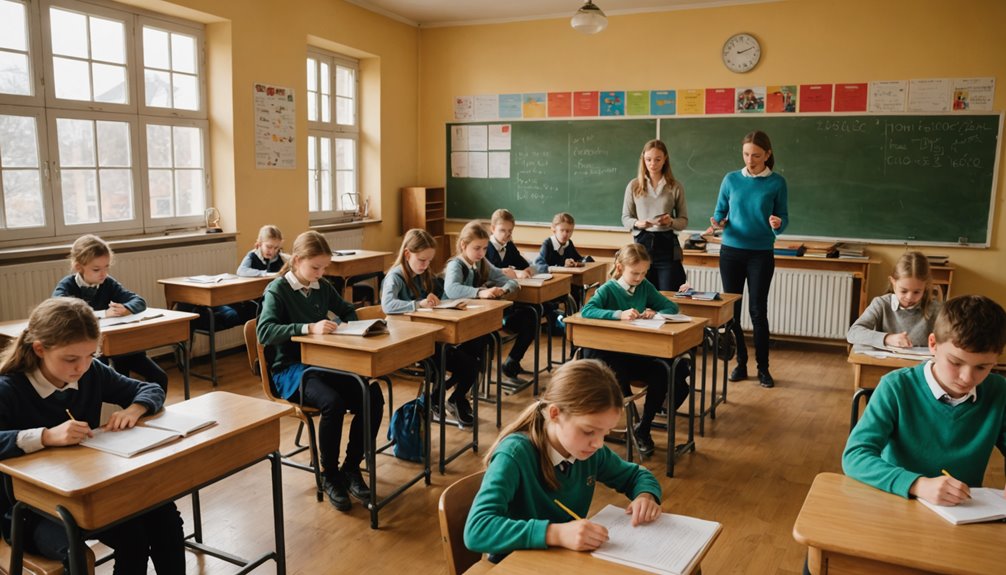
Divieto totale vs. moderazione
Quando si considera il dibattito tra l'implementazione di un divieto totale sui telefoni cellulari nelle scuole rispetto all'adozione di un approccio moderato, la preoccupazione principale ruota attorno al bilanciamento dei benefici educativi con potenziali svantaggi.
Un divieto totale, come quello di Vsetín, affronta le preoccupazioni dei genitori sulle distrazioni e l'interazione sociale, garantendo che gli studenti si concentrino sull'apprendimento. Questo approccio può mitigare il bullismo e migliorare l'impatto educativo creando un ambiente favorevole per rendimento scolasticoTuttavia, solleva questioni circa la violazione dei diritti dei genitori e la praticità dell'applicazione.
Al contrario, un approccio moderato consente integrazione tecnologica, abbracciando la realtà di alfabetizzazione digitale In educazione moderna. Considera le prospettive degli studenti, riconoscendo che molti considerano i dispositivi digitali come strumenti essenziali per l'apprendimento. Questa strategia potrebbe preparare meglio gli studenti a un futuro dipendente dalla tecnologia. Tuttavia, richiede politiche solide per garantire uso responsabile, che può essere difficile implementare in modo coerente.
In definitiva, entrambi gli approcci presentano argomenti validi. Mentre un divieto totale dà priorità a miglioramenti immediati nell'interazione sociale e nella concentrazione, la moderazione promuove la comprensione di un uso responsabile della tecnologia. Le scuole devono soppesare queste opzioni, considerando i loro contesti unici e le diverse esigenze dei loro studenti e delle loro comunità.
Utilizzo di custodie per telefoni con serratura per far rispettare il divieto di utilizzo dei telefoni nelle scuole
Mentre le scuole nella Repubblica Ceca, comprese quelle di Vsetín, iniziano ad applicare politiche telefoniche più severe, gestire in modo efficiente l'archiviazione dei telefoni è diventata una sfida crescente. Un divieto di telefonia ben implementato richiede più di semplici regole: ha bisogno di una soluzione sicura e pratica per tenere i dispositivi degli studenti fuori dalla portata e prevenire distrazioni. Ecco dove Blocco del telefono'S tasche del telefono con chiusura offrono uno strumento prezioso per le scuole.
Blocco del telefono fornisce un metodo sicuro e di facile utilizzo per le scuole per raccogliere, conservare e gestire i telefoni degli studenti durante l'orario scolastico. A differenza di altri sistemi, come Là, che sono in genere progettati per eventi di breve durata come concerti, Blocco del telefono si concentra sull'uso quotidiano a lungo termine all'interno delle scuole, offrendo una soluzione semplice ed efficiente ai divieti di utilizzo del telefono che durano tutto il giorno.
Principali vantaggi delle custodie PhoneLocker per le scuole
Per capire perché le custodie PhoneLocker si distinguono come una soluzione pratica per le scuole, approfondiamo i loro vantaggi esclusivi. Queste custodie affrontano le sfide critiche dell'applicazione dei divieti telefonici, combinando semplicità, personalizzazione ed efficacia. Di seguito sono riportati i vantaggi chiave che rendono PhoneLocker la scelta ideale per le scuole che mirano a ridurre le distrazioni e ad aumentare il coinvolgimento degli studenti.
- Sicuro e semplice: I telefoni sono chiusi a chiave in custodie antimanomissione, riducendo le distrazioni senza la necessità di politiche complicate. Gli insegnanti possono gestire facilmente la raccolta dei telefoni, assicurandosi che gli studenti non possano accedere ai loro dispositivi durante l'orario scolastico.
- Personalizzabile: Le scuole possono personalizzare le buste con colori o etichette diversi, consentendo una facile identificazione mantenendo l'organizzazione. Questa personalizzazione aiuta a semplificare il processo per insegnanti e amministratori
- Miglioramento della concentrazione e dell'interazione sociale: Limitando l'uso del telefono, gli studenti sono incoraggiati a impegnarsi in interazioni faccia a faccia, favorendo migliori abilità sociali e migliorando la concentrazione in classe. Un tempo ridotto davanti allo schermo supporta anche una migliore salute mentale e un migliore benessere.
- Conveniente e facile da implementare: Blocco del telefono è una soluzione conveniente che le scuole possono adottare facilmente senza dover ricorrere a una formazione o a infrastrutture specifiche, il che la rende la scelta ideale per istituti di tutte le dimensioni.
Con i divieti telefonici sempre più comuni nelle scuole, PhoneLocker fornisce una soluzione sicura e intuitiva per gestire l'uso del telefono. Che una scuola imponga un divieto totale o restrizioni parziali, il Custodia per telefono PhoneLocker possono essere personalizzati in base alle loro specifiche esigenze, garantendo un'implementazione fluida delle policy sulla telefonia mobile.
Per maggiori dettagli su come le custodie per telefoni cellulari con serratura di PhoneLocker possono aiutare a far rispettare le policy della tua scuola in materia di telefonia mobile, contattaci.
Domande frequenti
Come dice il proverbio, "il diavolo è nei dettagli". Le reazioni dei genitori sono contrastanti, e citano preoccupazioni sulle conseguenze per gli studenti e sulle eccezioni di emergenza. Il divieto ha un impatto sulle interazioni sociali, spingendo a una valutazione dell'efficacia per bilanciare disciplina e connettività.
Violare il divieto di usare il telefono può portare a misure disciplinari, con potenziali impatti sul rendimento scolastico, sulle relazioni tra pari e sulla salute mentale. Affrontare le distrazioni in classe è fondamentale per promuovere un ambiente favorevole all'apprendimento e al benessere degli studenti.
Di solito vengono prese in considerazione eccezioni di emergenza ai divieti telefonici nelle scuole, con reazioni variabili da parte dei genitori. L'applicazione efficace delle conseguenze è fondamentale per mantenere l'ordine. Una valutazione delle interazioni sociali e dell'efficacia complessiva è necessaria per garantire un'attuazione equilibrata delle politiche.
Mentre gli schermi digitali svaniscono sullo sfondo, le interazioni faccia a faccia potrebbero diventare la tela per sviluppare abilità sociali. Le relazioni tra pari, le dinamiche dell'ora di pranzo e le capacità comunicative potrebbero prosperare, favorendo la costruzione della comunità, migliorando la salute mentale e limitando il tempo trascorso davanti allo schermo.
La valutazione dell'efficacia del divieto di usare il telefono includerà la valutazione delle prestazioni degli studenti, dell'impegno accademico e delle distrazioni in classe. Saranno inoltre analizzati il feedback degli insegnanti e l'influenza dei pari per comprendere gli impatti più ampi sull'ambiente educativo.
Conclusione
L'implementazione di divieti di telefonia mobile nelle scuole, come si è visto a Vsetín, evidenzia una tendenza globale che dà priorità all'attenzione educativa e alla gestione comportamentale. Quali sono le implicazioni più ampie di tali politiche sullo sviluppo degli studenti e sulle dinamiche comunicative? Mentre le prove supportano la riduzione delle distrazioni e ambienti di apprendimento migliorati, persistono delle sfide nel bilanciare questi benefici con le preoccupazioni circa diritti dei genitoriPoiché vari paesi adottano misure simili, esame in corso sia dei risultati che delle critiche saranno essenziali per dare forma alle future strategie educative.


